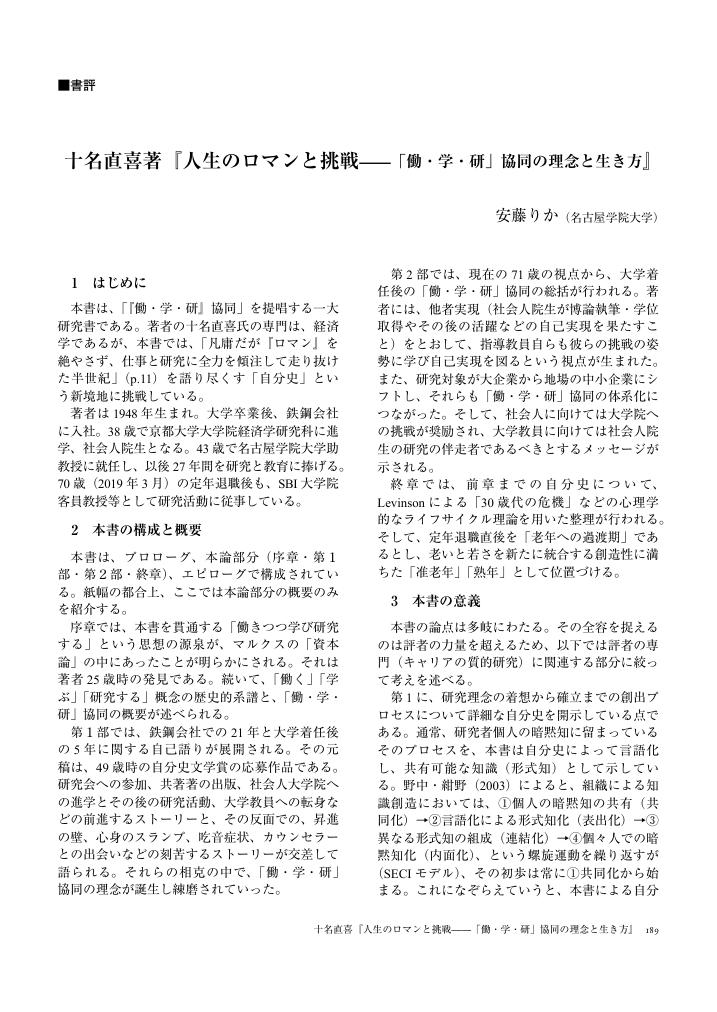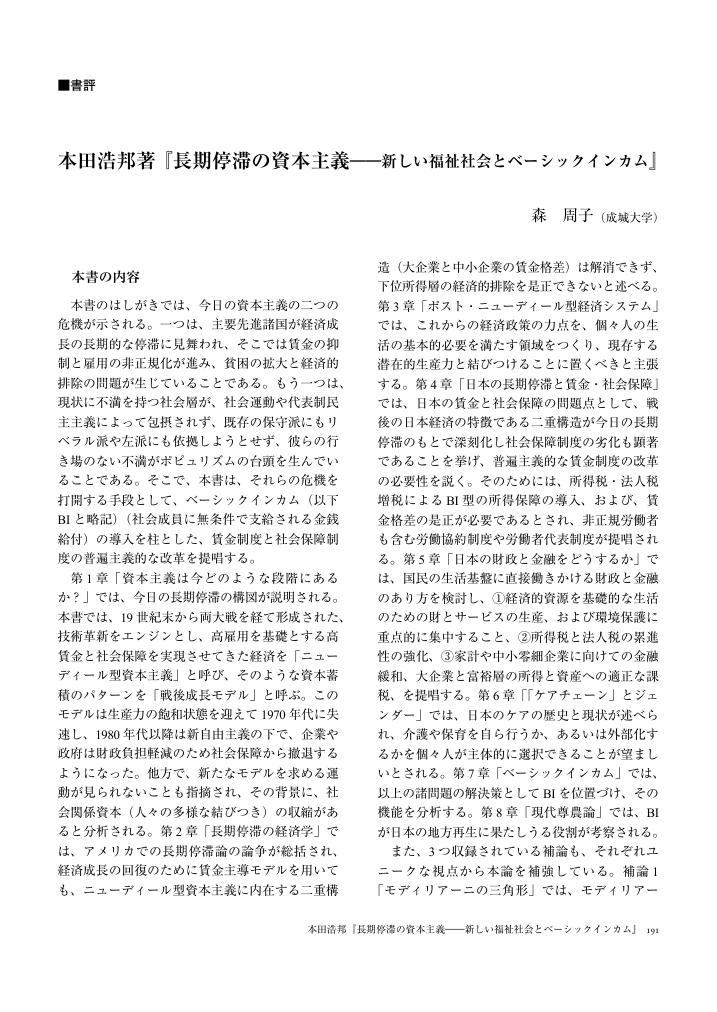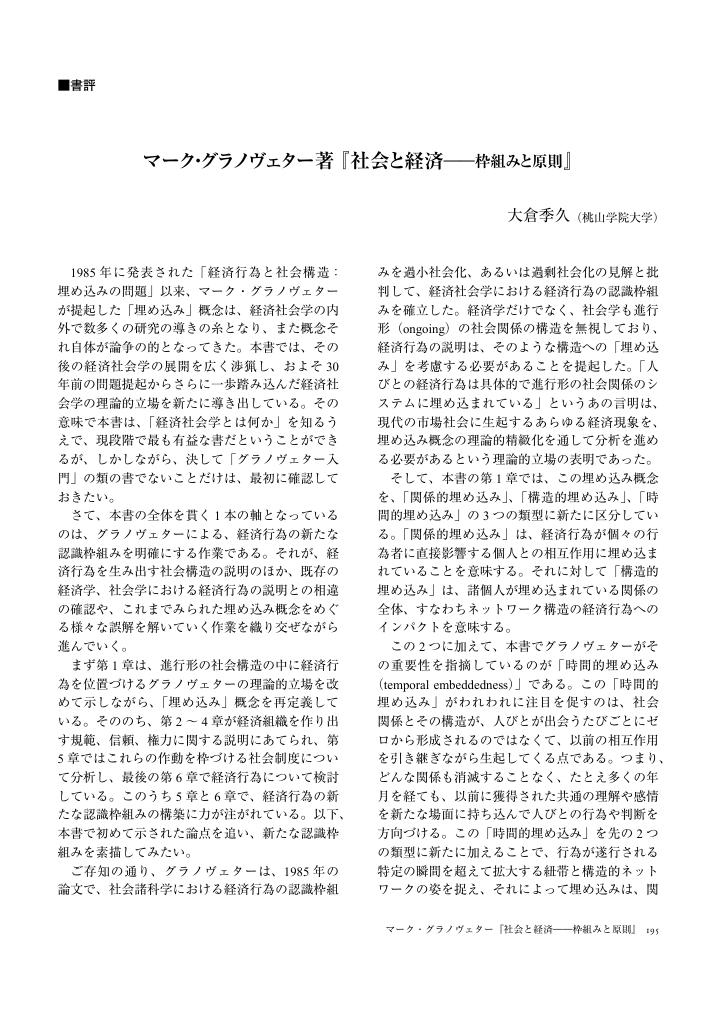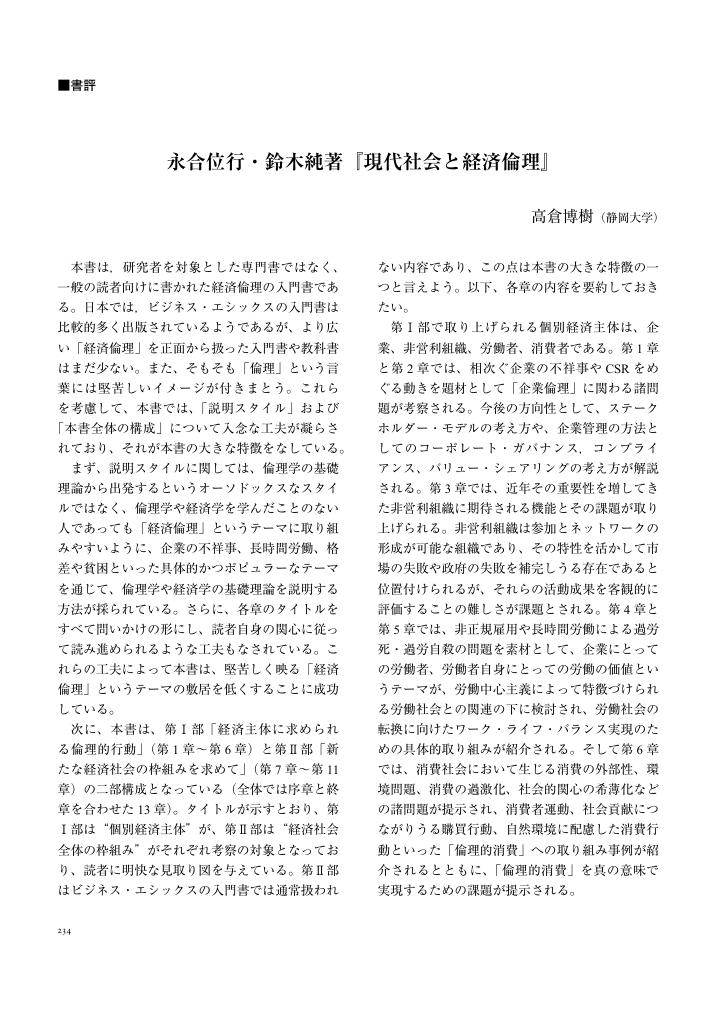1 0 0 0 OA 消費文化の情報化と社会の持続可能性 新しい生活様式を中心に
- 著者
- 水原 俊博
- 出版者
- 経済社会学会
- 雑誌
- 経済社会学会年報 (ISSN:09183116)
- 巻号頁・発行日
- vol.43, pp.5-14, 2021 (Released:2022-11-27)
- 著者
- 澤田 景子
- 出版者
- 経済社会学会
- 雑誌
- 経済社会学会年報 (ISSN:09183116)
- 巻号頁・発行日
- vol.42, pp.84-96, 2020 (Released:2021-04-01)
A group interview survey was conducted on 15 women in their thirties to fifties who are currently in double care or have experience in the past to make a concrete examination of the support system and development based on the needs of double care parties. From the analysis results, it was found that the double care parties want to realize a “care balance that stabilizes the life of the whole family” by providing support and continuous external services to improve self-help ability. It is desirable to build a model of institutional support and cooperation/collaboration allows various sections to develop integrally while sharing issues and purposes. In addition, it is necessary to improve the process leading to the use of services, to provide an early and continuous intervention of a cross-sectional consultation support team, and to support an environment in which the family can share the responsibility and role of care.
- 著者
- 礒井 純充
- 出版者
- 経済社会学会
- 雑誌
- 経済社会学会年報 (ISSN:09183116)
- 巻号頁・発行日
- vol.42, pp.97-109, 2020 (Released:2021-04-01)
In recent years, the number of “elderly housing with life support service (hereinafter, this is called “elderly housing”)” has been increased under subsidiary programs supported by the national government. NTT Urban Development Corporation has promoted a project to build an apartment for rent and an elderly housing in the same area, which could realize multi-generational community there. Furthermore, in order to forge local community, a micro library called “machi-library” has been set up in a cafe anyone can access to, which has been established in the elderly housing. This thesis aims to provide analysis of how the machi-library influences the residents' social behavior and mindset, especially focusing on community ties in the elderly housing area, and what roles this machi-library plays there. I performed a series of methods to verify my study: analyzing observations on the library, taking a survey from the users (both residents and non-residents) and monitoring, and hearing with the developers. As a result, I have found that forging community ties in the elderly housing requires an environment with no social roles/status nor special interests involved. No matter how you old, people tend to look for relationships not being bothered with social roles/status nor special interests; however, their social activities have been reduced due to decreased strength with aging. Therefore, the elderly people who have less opportunity to meet people, have expected the library as a place for an encounter other than social welfare staff. Considering the situation, I have found that a “community hub,” a person facilitating communications among people should play a very important role to function the community. Additionally, the developer has evaluated the idea that deploying micro libraries to their commodities should be profitable from the business point of view. To sum up, it is clear that investments to community facilities and its human resources in elderly housings could contribute to building customer satisfaction with residents and promote their commodities in the market. In addition to this, micro libraries should play a focal role to forge open community in society.
- 著者
- 戸川 和成
- 出版者
- 経済社会学会
- 雑誌
- 経済社会学会年報 (ISSN:09183116)
- 巻号頁・発行日
- vol.42, pp.171-188, 2020 (Released:2021-04-01)
This research clarifies the situation of collaboration between local governments and civil society organizations in 23 wards of Tokyo and the impact of them to citizen's efficacy toward local public policy. The downtown area of the 23 wards of Tokyo has a denser population than other areas. And the burden on the local governments are greater in the overcrowded downtown area than in other areas. Because of this local situations, civil society organizations are working with the administration to supplement the provision of public services.
1 0 0 0 OA 書評 十名直喜 著『人生のロマンと挑戦——「働・学・研」協同の理念と生き方』
- 著者
- 安藤 りか
- 出版者
- 経済社会学会
- 雑誌
- 経済社会学会年報 (ISSN:09183116)
- 巻号頁・発行日
- vol.42, pp.189-190, 2020 (Released:2021-04-01)
1 0 0 0 OA 書評 本田浩邦 著『長期停滞の資本主義――新しい福祉社会とベーシックインカム』
- 著者
- 森 周子
- 出版者
- 経済社会学会
- 雑誌
- 経済社会学会年報 (ISSN:09183116)
- 巻号頁・発行日
- vol.42, pp.191-192, 2020 (Released:2021-04-01)
1 0 0 0 OA 書評 山田秀 著『人間と社会──自然法研究』
- 著者
- 永合 位行
- 出版者
- 経済社会学会
- 雑誌
- 経済社会学会年報 (ISSN:09183116)
- 巻号頁・発行日
- vol.42, pp.193-194, 2020 (Released:2021-04-01)
1 0 0 0 OA 書評 マーク・グラノヴェター 著/渡辺深 訳『社会と経済――枠組みと原則』
- 著者
- 大倉 季久
- 出版者
- 経済社会学会
- 雑誌
- 経済社会学会年報 (ISSN:09183116)
- 巻号頁・発行日
- vol.42, pp.195-196, 2020 (Released:2021-04-01)
1 0 0 0 OA 書評 永合位行·鈴木純 著『現代社会と経済倫理』
- 著者
- 高倉 博樹
- 出版者
- 経済社会学会
- 雑誌
- 経済社会学会年報 (ISSN:09183116)
- 巻号頁・発行日
- vol.41, pp.234-235, 2019 (Released:2021-09-10)
- 著者
- 森 周子
- 出版者
- 経済社会学会
- 雑誌
- 経済社会学会年報 (ISSN:09183116)
- 巻号頁・発行日
- vol.41, pp.236-237, 2019 (Released:2021-09-10)
1 0 0 0 OA 書評 三浦まり 編『社会への投資——〈個人〉を支える〈つながり〉を築く』
- 著者
- 宮垣 元
- 出版者
- 経済社会学会
- 雑誌
- 経済社会学会年報 (ISSN:09183116)
- 巻号頁・発行日
- vol.41, pp.238-239, 2019 (Released:2021-09-10)
1 0 0 0 OA 書評 十名直喜 著『企業不祥事と日本的経営——品質と働き方のダイナミズム』
- 著者
- 山本 圭三
- 出版者
- 経済社会学会
- 雑誌
- 経済社会学会年報 (ISSN:09183116)
- 巻号頁・発行日
- vol.41, pp.240-241, 2019 (Released:2021-09-10)
1 0 0 0 OA 音楽が紡ぎ出す社会のハーモニー コミュニティ音楽療法による地域支援の試み
- 著者
- 木村 博子
- 出版者
- 経済社会学会
- 雑誌
- 経済社会学会年報 (ISSN:09183116)
- 巻号頁・発行日
- vol.42, pp.5-13, 2020 (Released:2021-04-01)
In the age of globalism, to live together with diverse people is a pressing issue. However, the growing disparity of society due to economic inequality makes it more difficult to realize. Music therapy has aimed to help people with disabilities to play a more active part in society since the 1980s. Community Music Therapy emerged in Europe with the aim of changing not people but society in general in order to be more accessible for those with disabilities. Community Music Therapy applies principles of social justice and equality and works within communities in order to realize an inclusive society through “Musicking.” Musicking is an innate ability of human being to perform music, regardless of talent or musical skills. It involves not only the performance of and listening to music but also various activities that enable music to happen, including management of concerts, advertising of music events, backstage work and so on. Community Music Therapy aims to convey the voices of people who suffer from exclusion and isolation to society and its policy lies in the belief that every human being has right to live with dignity without been excluded from community. It can be defined as a (small) social change for creating a more free and equal society through music, which is a pleasant medium for all.
- 著者
- 加藤 壮一郎
- 出版者
- 経済社会学会
- 雑誌
- 経済社会学会年報 (ISSN:09183116)
- 巻号頁・発行日
- vol.42, pp.14-23, 2020 (Released:2021-04-01)
1 0 0 0 OA 断酒会における当事者の絆とその形成要因
- 著者
- 豊山 宗洋
- 出版者
- 経済社会学会
- 雑誌
- 経済社会学会年報 (ISSN:09183116)
- 巻号頁・発行日
- vol.42, pp.27-33, 2020 (Released:2021-04-01)
1 0 0 0 OA 東南アジアにおける金融互助 フィリピン、インドネシア、タイ
- 著者
- 恩田 守雄
- 出版者
- 経済社会学会
- 雑誌
- 経済社会学会年報 (ISSN:09183116)
- 巻号頁・発行日
- vol.42, pp.37-52, 2020 (Released:2021-04-01)
1 0 0 0 OA ローティにおける「国民宗教」としてのアメリカ民主主義論
- 著者
- 大賀 祐樹
- 出版者
- 経済社会学会
- 雑誌
- 経済社会学会年報 (ISSN:09183116)
- 巻号頁・発行日
- vol.41, pp.172-180, 2019 (Released:2021-09-10)
Richard Rorty is a philosopher who advocates pragmatism and anti-foundationalism, and also known as a philosopher who insists the need for the American left to regain its pride in the nation. He called the American left in early 20th century as “Reformist Left.” Rorty argues that the Reformist Left has a kind of faith as a “civic religion” to America and democracy. This term evokes the concept of “civil religion” that focuses on the religious in public. What is “civic religion” and what can be said in compared to “civil religion?” Through this consideration, this paper aims at clarifying the point of how Rorty characterizes the democracy in America. “Civic religion” is common with “civil religion” in that it is not based on a specific religious sect. However, there is a difference in that “civic religion” does not assume the assumption of “god” or religious faith. In a general sense, it is not regarded as religion, but as a custom or culture shared by individuals in private. In other words, Rorty's “civic religion” does not has a specific relationship or direct influence with the certain religion, but a democratic culture, values, customs, and so on that are shared in American society. It is a statement of people's belief to “a way of life” and “pride” that arises from these convictions, and is considered to be a form of belief that is something which expressed in the term “religion.” On the other hand, Rorty's “civic religion” can't consistently keep the distinction between public and private. Because it could not ignore the process in which American democratic culture and values were formed under the influence of Christian values. Why does Rorty emphasize secularism, and use the term and concept of “civic religion” which emphasize the aspect of religion? As the reason, it is thought that the influence from Dewey is so important for Rorty. While referring to Dewey, Rorty emphasizes the pseudo-religious functions and beliefs of the individual as shared cultures and customs rather than the certain religious things. It became clear that “civic religion” does not consistently maintain the anti-foundationalism public-private distinction. Therefore, it can be said that from now on, it will be necessary to read from Rorty's debate on democracy from a different point of view from the anti-foundationalism that he maintained.
- 著者
- 戸川 和成
- 出版者
- 経済社会学会
- 雑誌
- 経済社会学会年報 (ISSN:09183116)
- 巻号頁・発行日
- vol.41, pp.197-210, 2019 (Released:2021-09-10)
This research clarifies the missing link between social capital and policy performance from the viewpoint of local governance. Social capital can increase policy satisfaction by working collaboration and government network management. Trust in government as “Linking Social Capital,” network of interactions among residents, and activities of associations and neighborhood associations are important. From this research, the impact of social capital on local governance leading higher policy satisfaction was clarified by the analysis in Tokyo metropolitan area.
1 0 0 0 OA シェアリング・エコノミー拡大の社会文化的要因 物質主義、エコ志向、ソーシャル・キャピタル
- 著者
- 寺島 拓幸
- 出版者
- 経済社会学会
- 雑誌
- 経済社会学会年報 (ISSN:09183116)
- 巻号頁・発行日
- vol.41, pp.211-223, 2019 (Released:2021-09-10)
According to the representative literature (Botsman and Rogers 2010; Gansky 2010; Rifkin 2014), some socio-cultural factors are thought to have affected strongly the recent global diffusion of the sharing economy. In this paper, in terms of economic sociology, we took up three factors that are weakening in materialism, the rise in eco-consciousness, and the degree of social capital. And then we verified the relationship between those three factors and the intention to use the sharing economy services. The data (N = 1,609) from the consumer survey conducted between September and October 2016, in Tokyo metropolitan area were used for the verification. Our results indicated that, contrary to what was considered in the previous studies, the materialistic attitude prompted the intention to use. Eco-consciousness was also positively correlated with the intention. Concerning the social capital, while networks and norms both had a positive relation to the intention to use, the trust had statistically nothing to do with it.
1 0 0 0 OA 書評 藤岡真之 著『消費社会の変容と健康志向——脱物質主義と曖昧さ耐性』
- 著者
- 田中 人
- 出版者
- 経済社会学会
- 雑誌
- 経済社会学会年報 (ISSN:09183116)
- 巻号頁・発行日
- vol.41, pp.224-225, 2019 (Released:2021-09-10)












